| Srl | Item |
| 1 |
ID:
166786


|
|
|
|
|
| Summary/Abstract |
The underlying assumption of this article is that network resonance is autocatalytic for drastic or large-scale socio-political transformation as an unexpected consequence of social emergence. To test this, the transnational Helsinki network is examined as an empirical case. The Helsinki network, organised following the signing of the Helsinki Final Act in 1975, contributed significantly to the demise of communism in Eastern Europe in 1989. The case study demonstrates that the self-organisation of chain reactions in the Helsinki network triggered autocatalytic dynamics that led to the wave of revolutions in Eastern Europe in 1989.
|
|
|
|
|
|
|
|
|
|
|
|
|
|
|
|
| 2 |
ID:
166787


|
|
|
|
|
| Summary/Abstract |
A causal association was found between higher levels of corruption and lower levels of satisfaction with local and national governments. However, interaction term analysis provides suggestive evidence that: first, as public service satisfaction increases, the effects of corruption change from negative values to positive values for both local and national governments; second, as political situations improve, the negative effects of corruption diminish for both local and national governments; and, third, as the economic situation improves, the negative effects of corruption diminish for local, but not for national governments.
|
|
|
|
|
|
|
|
|
|
|
|
|
|
|
|
| 3 |
ID:
166792


|
|
|
|
|
| Summary/Abstract |
There is a widespread fear that Islamist and ‘extremist’ orientations are gaining strength in Central Asia, particularly among younger people. This article, examining data from a 2011–2012 survey in the region, finds little evidence to support this proposition. While there is sizeable support for some Islamist beliefs, age is not a strong predictor of such orientations. Interestingly, assertions that Central Asian youth are more likely to feel marginalised or dissatisfied with current socio-economic conditions also do not appear to hold. Overall, rural residence and low education stand out as better predictors, with various socio-economic and political assessments having mixed effects.
|
|
|
|
|
|
|
|
|
|
|
|
|
|
|
|
| 4 |
ID:
166788


|
|
|
|
|
| Summary/Abstract |
The elites of Western Europe prefer social security for all citizens as the major aim of the EU, while the preference of Central and Eastern European elites is for a more globally competitive European economy. This disparity between elite preferences may be accounted for by the distinct electorates and elites’ responsive strategic calculations, or by the process of socialisation Central and Eastern European elites undergo during exposure to the EU. This article argues that the predominant reason for the difference in elite attitudes towards economic competition is the lasting effect of state socialism in Central and Eastern European countries.
|
|
|
|
|
|
|
|
|
|
|
|
|
|
|
|
| 5 |
ID:
166789


|
|
|
|
|
| Summary/Abstract |
The focus of this article is on ethnic diversity and polarisation in Latvia after 1989. Our fundamental question is that if we interpret diversification as a dynamic process, and include polarisation as a potential direction of diversification, how much will the results differ, compared to the explanations usually proposed in the literature? The recognition that apparent homogenisation results, in particular cases, in polarisation (in this case in 35% of Latvia’s entire population) is the major contribution of our empirical analysis. Taking into account the broad scale of the potential impact of polarisation, our findings raise significant questions for the classification mechanisms that may be employed in further investigations.
|
|
|
|
|
|
|
|
|
|
|
|
|
|
|
|
| 6 |
ID:
166790


|
|
|
|
|
| Summary/Abstract |
This article analyses the political rhetoric of Russian President Vladimir Putin. Scholars and journalists have devoted considerable space to discussing Putin's policies, but have paid little attention to his political speeches, often assuming that he is purely a pragmatist and that his rhetoric is therefore of little interest. This article argues that a comprehensive analysis of rhetoric helps to reveal Putin's political and ideological orientation. To do so, the article carries out a systematic examination of Putin's political speeches and interviews, and shows that Putin has demonstrated an overall consistency in the general line of his views, albeit with certain changes within that line. Therefore his rhetoric is more than an instrument to confuse political opponents and should be taken seriously as an indication of Putin's policy direction.
|
|
|
|
|
|
|
|
|
|
|
|
|
|
|
|
| 7 |
ID:
166791


|
|
|
|
|
| Summary/Abstract |
The primary elections of the United Russia party serve as a tool for party organisation and voter mobilisation. In this study, we employ United Russia’s capacity to mobilise voter turnout in the 2016 primary elections as an indirect indicator of the strength of party-controlled regional political machines. Our analysis of the results of the 2016 Duma elections in 83 regions of Russia demonstrates that voter turnout in the spring 2016 party primaries of United Russia to a significant extent explains cross-regional variation in party success.
|
|
|
|
|
|
|
|
|
|
|
|
|
|
|
|